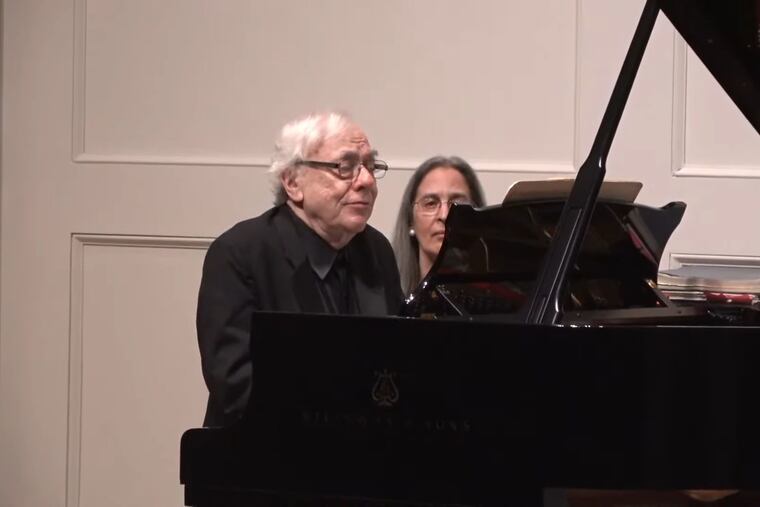Pianist Richard Goode finds his happy place in livestreamed PCMS recital
The long-acclaimed PCMS musical anchor broke out in a smile as he picked and chose among Debussy’s "Preludes" near the end of a masterful program.

What does it take to make pianist Richard Goode smile?
Never the most effusive concert artist, the 77-year-old Goode — one of Philadelphia Chamber Music Society’s long-acclaimed musical anchors — tends to stoically disappear into the music in noninterventionist performances that are born out of deep understanding.
The opening of his livestreamed Bach/Beethoven/Debussy PCMS recital Wednesday night (available on demand through Saturday evening) was Bach’s Partita No. 4 in D major with its odd, tricky time signatures that make you wonder what the composer was thinking.
Musical ideas don’t necessarily glide into one another in this piece. And in Goode’s hands, the first-movement “Overture” wasn’t very imposing. The “Allemande,” a great marriage of heart and logic, was beautifully rendered but with very dry eyes. Characteristically, Goode seemed to throw the piece back in your lap, as if to say, “Well, what do you think?” And because the concert is available on demand, one can revisit it and indeed formulate answers.
Near the end of the recital, however, Goode’s music making took a different turn. He picked and chose through both books of Debussy’s Preludes. And from the opening moments, the telltale video cameras caught him smiling, again and again, as he meticulously shaped Debussy’s detailed musical imagery, never failing to guide your ears with a strong sense of narrative.
The subtitles of the individual preludes — “Mists,” “Footsteps in the Snow,” “Ondine” — were seen on a lower corner on the video screen, reminding you of Debussy’s poetic starting points, as each prelude explores its own kind of interplay of disparate musical elements.
Goode’s coloring was masterful, always reminding you that bursts of Impressionistic sunlight have their counterpart in gothic darkness (Remember, Debussy left an unfinished opera adaptation of The Fall of the House of Usher.)
Beethoven’s Piano Sonata No. 28, Op. 101 found Goode playing a piece that has long been central to his repertoire (and, personally, is my desert-island sonata), but was heard on Wednesday with freshness.
Like much of late Beethoven, this sonata has a lot of moving parts that crowd into the picture, sometimes echoing each other, sometimes in conversation. Everything was integrated by Goode with such clarity that even the trills and grace notes — which can be like frosting on the cake — added significant energy to the discourse. In Beethoven, there is no frosting.
What’s the through-line in this program? The fact that one still asks such questions of a pianist whose recitals have been a Philadelphia fixture for some 55 years speaks well for Goode’s continued evolution.
My answer: This was a program of conflicts. Bach definitely could be cranky. Debussy’s imagery is almost like characters that change their stories at every iteration. Beethoven was utilizing everything he knew up until that time and telling you that the different elements need not fit — at all — in order to belong together.
Available for streaming through Saturday evening, free (with a requested donation) at pcmsconcerts.org.